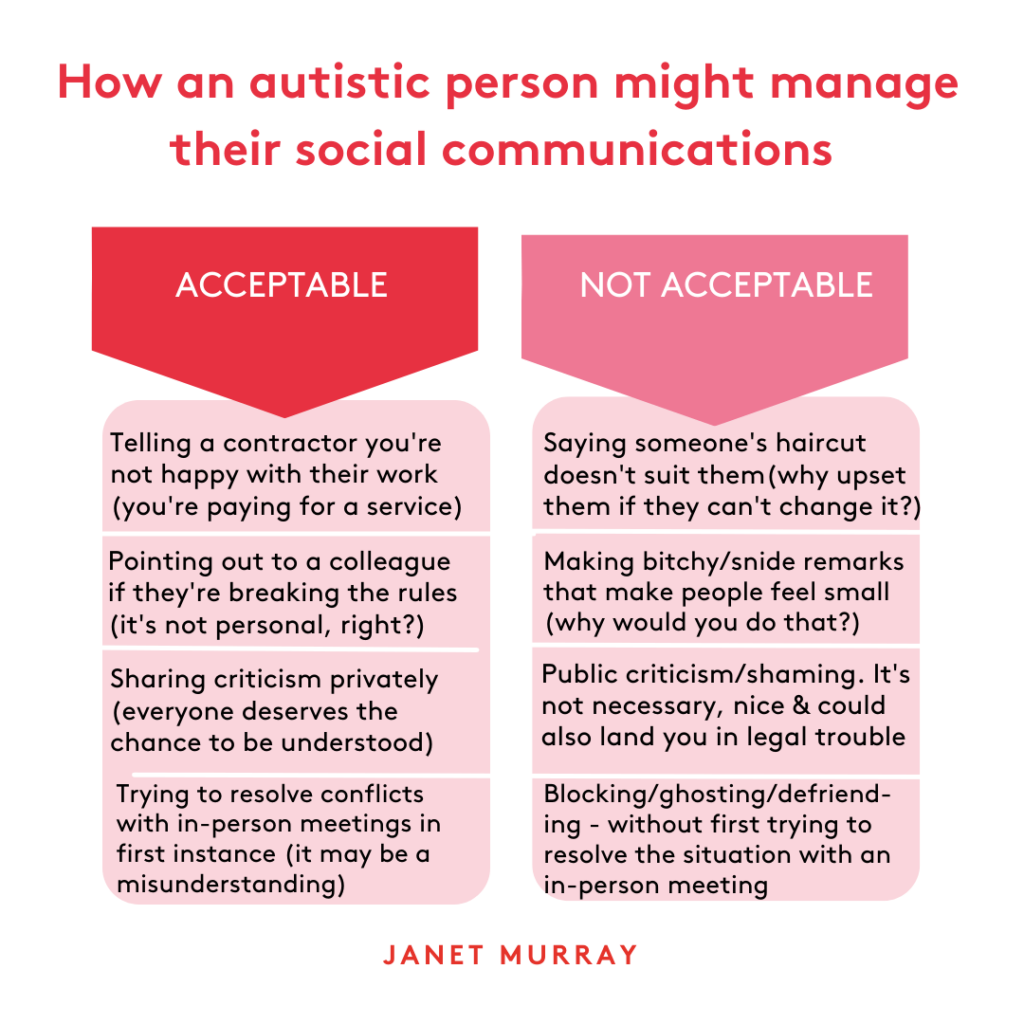
How I discovered I’m autistic and have ADHD
July 13, 2022
Many more women are discovering they’re autistic later in life.

Including many women who may not appear to fit the ‘stereotypical’ perceptions of autism.
Like TV presenter Melanie Sykes, model and TV presenter Christine McGuinness (wife of Top Gear presenter Paddy) and Period Power author Maisie Hill.
I’ve talked openly about my diagnosis of ADHD. Earlier this year I discovered that I’m also autistic. Something that has taken me longer to feel comfortable talking about – mainly I feel because of my fear of not being ‘believed’. Mainly due to peoples’ stereotypical and, quite frankly, outdated views on what autism looks like – particularly in women.
In this episode of the Courageous Content Podcast (which you can also read as a blog) I share what led me to this discovery and how it’s impacting my life and business.
You’ll learn:
In the past, I guess I’d have got an Aspergers diagnosis – but it all comes under the ‘umbrella’ of autism now.
I’ll share more about what led to this discovery in a sec…but first I want to share a few things I’ve learned along the way that might help (particularly if you’re new to this topic).
- Autism is still widely misunderstood – and hugely under-diagnosed – in girls and women
- It’s not true to say everyone is a ‘little bit autistic’ – you either are or you aren’t
- Autism doesn’t have particular ‘look’ (which is why it’s not helpful to tell an autistic person they don’t ‘look’ autistic)
- ‘High functioning autism’ can be an unhelpful label – how someone *appears* to be getting on may not be an accurate reflection of how they’re functioning
- Autism shows up differently in different people – hence someone not being like your autistic cousin/friend’s autistic son doesn’t mean they’re not autistic
What autism is (and how it affects people)
It may also be helpful to know that autism is thought to affect three key areas: social relationships, communication and flexibility of thought. Many autistic people also experience sensory issues.
Here’s my story…
Please try to keep an open mind as you’re reading/listening (this post is also available as a podcast episode). And do be aware that identifying one some or all of what I share does not mean you are or aren’t autistic. Or that anyone you know is or isn’t autistic – based on what I’ve shared.
But if you do want to explore the topic further, I’ve added some resources I personally have found useful at the end of this post.
What led me to suspect I may be autistic (as well as having ADHD)
I’ve always felt ‘different’ to other people. I couldn’t really put it into words (which is actually super relevant – more on this later).
But I guess the best way to describe it is a sense of being ‘disconnected’ from other people. As if I was seeing the world through a different lens.
I’d often find myself wondering if everyone around me was ‘acting’. Pretending to enjoy activities they didn’t actually like. Chatting about boring stuff (aka ‘small talk’) to be polite. Being super nice to people they said they said they ‘didn’t like’…it all seemed a bit baffling.
How autism can impact friendship
Friendships were problematic too. I find it easy to make friends – but sometimes struggle to keep them.
I’ve been ‘dropped’ from countless friendship groups over the years (something I put down to having ADHD and my tendency to forget other people exist when I’m hyperfocusing on work/a new interest).
But there was also The Look. ????
I’ve lost count of the times I’ve seen a look pass between friends and sensed I’ve said/done the ‘wrong’ thing – but not been able to interpret what it was.
I now realise I’m not always brilliant at ‘reading’ facial expressions and/or tone of voice (also important – more on this later).
I sometimes ask family members if they are annoyed/upset with me (or even if they’re mocking me!) because I’m not sure how to interpret the look on their face.
And drive them mad asking for clarification on what they meant when they said X, Y, or Z. But I wouldn’t feel comfortable asking anyone else.
So you can probably imagine how it might lead to misunderstandings (and missed social cues). And – in some cases – clinginess i.e. when you find someone who does ‘get’ you – you can turn into an overenthusiastic puppy – and end up smothering them. ????♀️
How autism can impact communication
I’ve always thought I was a pretty good communicator. I’m socially confident, genuinely interested in people and can start conversations easily.
But I’d rather stand on stage and talk to thousands of people than do ‘small talk’ with one person.
Because it’s exhausting trying to hold a conversation when there’s a running commentary going in your head: am I talking too much, are they bored, should I move away now, have I asked too many questions, am I being too intense, oversharing, am I looking at them too much (or too little)? Straighten up, smile, look interested…. ????
And when it takes that much effort to be around people, you have to develop coping strategies – in my case avoiding loud, crowded places, socialising in small groups, only going to places you can ‘escape’ from if you need to, restricting social activities to around two hours (when the ‘off switch’ goes on).
Strategies you’re hardly aware you’ve developed – until you stop to reflect.
At times, I’ve also been considered ‘rude’ (for things I didn’t feel were the slightest bit rude).
Because, for me, communication is very contextual.
For example, in my world, it’s not ok to go round telling people their hair looks ???? or they’ve got bad breath (because that would hurt their feelings). But it IS ok to:
- Tell an employee/contractor they have made a mistake or that you are unhappy with their work (because you are paying them for a service)
- Point out to a colleague that they are breaking the rules/protocol (because it’s not a personal criticism of them – it’s a fact!)
- Continue a discussion after someone has said ‘no’ to something (because you feel like perhaps they didn’t ‘get’ why/what you were asking)
But of course not everyone sees it like this… do they? ????♀️

So these are all things that have landed me in trouble. In some cases, caused me to be ostracised, bullied and even abused.
Can you imagine someone shouting at you – or cutting you off completely – for saying/doing something that feels completely inoffensive to you.
Or being told you’re cold and unfeeling when you know there’s the gentlest, kindest soul inside you?
And when you know you’re full of love and empathy (even if your face/words don’t always show it).
Some people DO see that part of you. Along with your tendency to take what people say at face value. Which is why many autistic people are vulnerable to being manipulated/controlled by people who don’t have their best interests at heart (been there too).
The emotional impact of autism (particularly when it’s undiagnosed)
A lifetime of being misunderstood can take its toll on your emotional wellbeing.
For someone who already has trouble recognising and describing their emotions (Alexithymia is the psychological term for it) managing them can be a challenge.
I used to say to my husband: ‘I feel wretched today and I don’t know why.’ I didn’t even know what I meant by ‘wretched’. It was a kind of uneasy, unsettled feeling that I couldn’t connect to any particular incident.
But when you don’t recognise that you’re starting to feel frustrated, angry or sad – you can be in full on ‘fight or flight’ mode before you’ve even registered a change in your emotional state.
Which means you’ve already hit ‘send’ on that email, told that person exactly what you think of their behaviour – or ended the relationship – before you’ve had a chance to think it through.
I’ve worked hard to control my emotions – particularly with crying (something I struggled with as a child). And I’ve learned to live with the fact that a cross/unkind word from someone can feel physically painful. But a lifetime of pushing your emotions down means when the lid comes off…it’s messy. ????
I used to think that crying uncontrollably for hours on end, physically shaking, vomiting – in response to events that were upsetting (but not devastating like a bereavement) was what everyone did behind closed doors. And that other people also took 5+ days to recover from an emotional upset.
I now know that’s what autistic burnout can look like. And I’ve been doing it over and over again, since I was in my early teens.
Autism and inflexible thought patterns
A common characteristic of autism is finding it challenging to seeing things from others’ perspectives. Along with inflexible thinking patterns. Neither of which are the same as lack of empathy (which many autistic people have in spades – even if they don’t express it the same way as others).
For example, in my world there IS a right and wrong way to behave in certain contexts e.g.
- You shouldn’t make bitchy comments – or send mean emails/messages – to people, unprovoked
- If you need to criticise someone’s behaviour, do it privately (and criticise the behaviour – not the person)
- If you have a problem with a friend/family member, ask them to meet and talk things through so you can try and understand each other better – don’t just block/defriend/ghost them
I’m not saying that my behaviour ‘rules’ are correct. But that is my ‘default setting’ if you like. And when your default setting is that everyone should uphold the same behaviour ‘code’ as you… you’re bound to get crushed (again and again and again).
There are upsides of course.
Inflexible thinking makes it easy to stick to the rules (as long as they make sense to you).
But it also makes you that pain in the ass who will tell other people when they’re not following the rules. And think you’re doing them a favour – ‘cos everyone likes to stick to the rules right?
Wrong ????♀️ (cue friendship/relationship problems).
What led me to seek an autism assessment
Last year, I found myself at crisis point.
There were a number of triggers. But the biggest one was getting involved in a conflict that caused me a great deal of emotional distress.
Not because I wanted to be ‘right’.
But because I put doing the ‘right thing’ over my own emotional wellbeing. And when I looked around me I couldn’t see anyone else doing the same.
This, ultimately, is what led me to look for an explanation as to WHY I couldn’t leave it. Why I couldn’t let ‘doing the right thing’ be someone else’s responsibility for a change. Or just chill the f**k out and let other people do the worrying. ????♀️
It led me to look for reasons for some of my behaviours/attitudes (which seemed ‘different’ to many other peoples’).
I’m not saying there’s anything wrong with sticking up for what you believe (I don’t think it’s any accident that there are so many social reformers and campaigners in the autistic community).
But doing what’s ‘right’ isn’t always the same as doing what’s right for you.
Why I’m delighted about being autistic
I’m conscious this post may sound negative. That’s not the case at all. I’m actually bloomin’ delighted about discovering I’m autistic. It explains so much about the struggles I’ve had to date (and why my ADHD diagnosis explained a lot but not all). And when you understand yourself better, you can be kinder to yourself – and get help with the things you find challenging.
Plus I feel sure my unusual way of seeing the world has definitely helped me hone my creative skills/talents. And being dogged, inflexible and not taking ‘no’ for an answer has served me very well at times.
But I do feel very weird about it all. I think most of that weirdness comes from other peoples’ perceptions of what autism looks like. My fear of not being ‘believed’ (as someone who doesn’t fit the – often wildly incorrect – stereotypes of autism).
Even now, when I scroll through social media accounts of autistic women – as a straight woman who wears make-up, dresses relatively fashionably for my age, doesn’t have a flat/monotone voice and can look people in the eye – well, I don’t see too many people who look/sound like me (but maybe I just haven’t found them). And of course I start to question the diagnosis.
Ultimately though, I know my challenges – and complicated inner/emotional world – are VERY real to me.
Why should it even matter what other people think?
Why more women are discovering they are autistic later in life
More women are discovering they’re autistic in their 30s, 40s and 50s (and it’s not because of TikTok!). Partly it’s because they learn early that certain behaviours are not ‘acceptable’ and learn to ‘mask’ in order to fit in.
Many (like myself) have ‘people’ as one of their special interests. They read obsessively about psychology – and hoover up books/advice on relationships/communications. ????????
Some (like myself) will also have been lucky enough to have a great support network. My family has always been a great source of emotional support, advice and acceptance. My mum gave me tons of good advice on relationships/communication when I was growing up. When I’m feeling ‘stuck’, I dip into my mental library of ‘Mum Advice’ – or I call and ask her.
But when you’ve spent years feeling like you’re just ‘wrong’ somehow – it’s only a matter of time before the wheels fall off.
Which is why so many women are misdiagnosed with mental health problems (multiple times) before autism is even considered. While I’ve never been diagnosed with a mental health problem, I can’t remember a time when I didn’t feel an underlying (and inexplicable) sense of sadness.
And I wonder how many other women might be out there like me?
Why I decided to share my autism discovery
My decision to share comes not because I feel the need to ‘explain’ myself – or have people make allowances for me.
And it doesn’t justify the behaviour of those who have bullied/ostracised me because of my ‘different’ way
of seeing the world.
Rather it comes from a feeling that perhaps we all need to be a bit kinder – and have more curiosity – about one another.
Because it’s easy to label someone as ’difficult’ when they are, in fact, just ‘different’ (guilty as charged, by the way – we’ve all done it).
If you’ve read to the end – first off, well done – it’s a mammoth post! ????
Secondly, I have a challenge for you.
Next time you find yourself feeling frustrated with someone who seems difficult/inflexible/unreasonable – or even rude – please take a moment to consider that they might just, in fact, just be seeing the world through a different lens.
Try changing your response. You may be surprised -or even delighted – by what you hear.
Recommended reading
Here’s some resources I have found particularly helpful.
Samantha Craft: Autistic Woman’s Checklist
Yo Samdy Sam (YouTube Channel)
Square Peg Podcast with Amy Richards
Struggles of Being Black & Autistic (interview with Tiffany Hammond)
You May also like

Useful Links
Janet Murray
- Website
- TikTok
- Janet Murray’s Courageous Content Live event
- Janet Murray's Courageous Blog Content Kit
- Save £30 on my Courageous Email Lead Magnet Content Kit using the code MAGNET67.
- Save £30 on my Business Basics Content Kit using the code PODCAST67.
- Save £30 on my Courageous Launch Content Kit using the code PODCAST67.
- Janet Murray’s Courators Kit
- Janet Murray’s Courageous Content Planner
- Janet Murray’s FREE Ultimate Course Launch Checklist




